Byl to krvavý nástroj komunistické propagandy, padlo tam 15 000 Čechoslováků a 45 000 Rusů, zbytečná a špatně připravená ofenziva, pokud si to dobře pamatuji od vojenského historika.
Battle of Dukla Pass
Categories: Wars
The Dukla Pass is the site of the largest battle in Slovakia during World War II. The Carpatho-Dukla operation, which included the battle for the Czechoslovak border, was intended to help the Slovak rebels. Originally it was supposed to last only 5 days, but in the end the fighting lasted 80 days.
6 October 1944
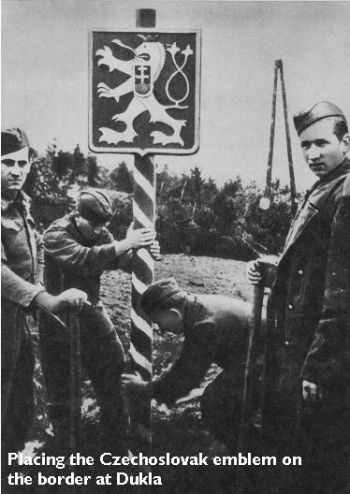
At six o'clock in the morning, General Moskalenko's army (1st Ukrainian Front), which included the 1st Czechoslovakian Army, entered the Czechoslovakia. Army Corps in the USSR on the territory of the former Czechoslovakia, formed the left flank. It broke through the Dukla Pass and started the direct liberation of the Czechoslovakia by the Soviet Army. The first liberated village on our territory became Nižní Komárov. The right wing consisted of the 1st Guards Army of Colonel General A. Grecko, located in the foothills of the Carpathian Mountains, roughly northeast of the Krosno-Sanok line.
After the outbreak of fighting in Slovakia in the rear of the German armies, the command of the Soviet Army imposed 1. and the 4th Ukrainian Front to carry out a military operation to aid the Slovak National Uprising, cross the Carpathian Mountains, enter Czechoslovakia and join the rebels. The troops were given only 4 days to prepare this entry.
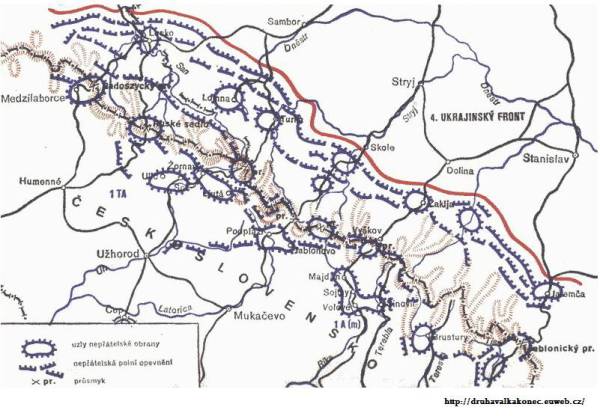
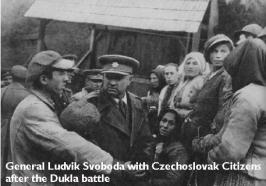
Later it turned out that the Carpathian-Dukla operation was not very successful. One of the reasons was the fact that 2. September, the German Heinrici group quickly and unexpectedly disarmed the eastern Slovak army, which had been counted on in the operational plans of the Red Army command in the battles on the Slovak-Polish border. Nearly 140 000 soldiers lost their lives in the operation. This was mainly due to the poor tactical deployment of some of the military groups and often to the conduct of attacks without prior reconnaissance of the terrain.
Interestingly, as in other armies, so too in our 1st Czechoslovak Corps in the USSR were the so-called penal detachments. We adopted them as a proven tactic from the Red Army. Soldiers who had committed an offence or were inconvenient to the concept of our army unit belonged to punishment detachments. They then had the honor of being on the offensive on the most difficult sections of the front. Most of them did not even have adequate equipment and had a second wave of soldiers in their rear ready to prevent their escape from the battlefield.
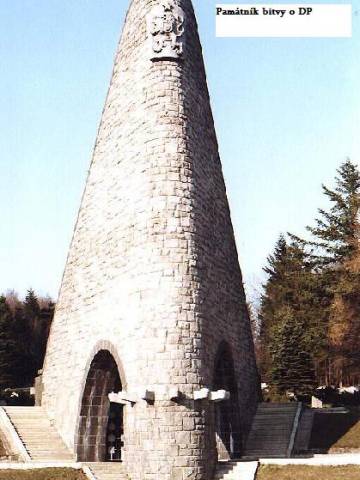
Communist propaganda then appropriated the Dukla as a propaganda tool. A politically directed wreath-laying ceremony was then held every year on the sixth of June at the monumental memorials in eastern Slovakia. It was only after the revolution that the silenced voices of historians began to be heard, calling Dukla a botched military operation. After the division of the republic, the Czech side neglected the Dukla tradition, while in Slovakia it has survived. In particular, the sixtieth anniversary of the liberation battles brought Dukla back into the spotlight. As in France, Omaha beach became the site of spectacular celebrations. Solemn speeches, anthems and deafening salvos of honor guards rang through the Dukla Valley. To the accompaniment of blue beacons, a motorcade of buses carrying the last surviving veterans headed to the memorials to receive their decorations. The seriousness of the celebrations was underlined by the presence of the Slovak President. However, when the reverberations of the anniversary have passed, the Dukla Pass will probably remain just a forgotten place somewhere in the East.
Unexploded ordnance was still maiming and killing the locals in the 1960s. Gradually, 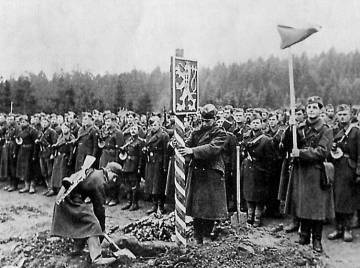 managed to clear the busier areas. But the days when the army used to clear the area in an organised way are long gone. "There were large minefields here and these were cleared by a demining tank which ploughed out the mines with a plough. Smaller sites were dug out by hand. We had to find the mine with a detector, carefully rake it out by hand, then tie a rope to it, walk fifty metres and pull it out of the ground. They could have been secured against removal. This is a death trap for the bomb squad," recalls Jan Pokorný, former commander of the Litoměřice engineer unit.who used to mine at Dukla at the end of the 1960s and has now returned here for a scientific conference held on the anniversary of the battle.
managed to clear the busier areas. But the days when the army used to clear the area in an organised way are long gone. "There were large minefields here and these were cleared by a demining tank which ploughed out the mines with a plough. Smaller sites were dug out by hand. We had to find the mine with a detector, carefully rake it out by hand, then tie a rope to it, walk fifty metres and pull it out of the ground. They could have been secured against removal. This is a death trap for the bomb squad," recalls Jan Pokorný, former commander of the Litoměřice engineer unit.who used to mine at Dukla at the end of the 1960s and has now returned here for a scientific conference held on the anniversary of the battle.
"The memorial and cemetery of the members of the 1st. Czechoslovak Army Corps" is a national cultural monument, the cemetery has graves with the names of 1,265 fallen fighters. Under the saddle stands a stone pylon (height 28 m) with a monumental sculpture (Slovak title: "Thanks to the mother of the Soviet soldier for liberation") and a ceremonial hall. In front of the monument, the "Avenue of the Heroes of Dukla" has been planted. A 49-metre high tower was built right on the state border on the site of the former "Observatory of General Ludvík Svoboda".
From the Dukla Pass to the village of Krajná Poľana there is the area of the "Military Natural Museum at Dukla" and the "Monument of Bomb Disposal Technicians" (a 4 metres high granite block with hands, symbolizing a sappers defusing mines planted by the Nazis).
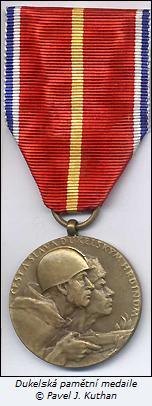 Dukla Commemorative Medal
Dukla Commemorative Medal
Established. 15th Anniversary of the fighting at Dukla and in recognition of merit for the liberation of the Czechoslovak Republic from fascist invaders and the strengthening of Czechoslovak-Soviet friendship.
Awarded to: living, fallen and deceased members
of the 1st Czechoslovak Army Corps in the USSR who fought in the battle of Dukla from 08. 09. to 28. 11. 1944, who took part in the fighting at Dukla, and to other citizens who, in the immediate connection with the Dukla operation, or otherwise contributed to appreciable damage to the enemy and to the assistance of Czechoslovak and Soviet units.
Number of honoured:
due to the number of the 1st Čs. This medal could have been awarded to approximately 16,000 members of the corps.
A detailed description of the battle can be found here:
http://cs.wikipedia.org/wiki/Karpatsko-dukelsk%C3%A1_operace
Source: www.czechpatriots.com, www.motorkari.cz, www.reflex.cz, www.rozhlas.cz, http://encyklopedie.seznam.cz/, http://cs.wikipedia.org/
You can search for World War II artifacts using our metal detectors.
The article is included in categories:
Post
Podla mojho nazoru to bola zle pripravena akcia z prilis vysokimi stratamy na zivotoch ,co vobec nevadilo Ruskemu veleniu a dalo to Cechoslovakom nech si to riadne uziju .Z dokumentarnich filmov som zaregistroval ,ze neraz bojovali aj na noze ,alebo len z malim mnostvom municie .ked uz aj tak nieco dobili boli nuteny sa hned stiahnut pre nedostatok municie alebo malemu poctu ludi.toto opakovali aj trikret denne.Bol to velmi tazky boj ,cest vsetkim padlim hrdinom.
Prvá obec ktorú oslobodil 1. čs armádny zbor bol Vyšný Komárník a nie prvou oslobodenou obcou v operácií. Prvou oslobodenou obcou bol Šarbov. Ináč tá mapka nemá nič spoločného s Duklov tá sa nachádza severnejšie.
Cetl jsem ze tak dochazelo i k bojum polnima lopatkama a i na pazby zbrani se dostalo......veleni uplne selhalo ....taky nefungovala delostrelecka priprava a v dusledku techto i vice faktoru byly takove velike ztraty:-(
nekrvavejsi kota 534!!!!
nekrvavejsi kota 534!!!!
Cetl jsem ze tak dochazelo i k bojum polnima lopatkama a i na pazby zbrani se dostalo......veleni uplne selhalo ....taky nefungovala delostrelecka priprava a v dusledku techto i vice faktoru byly takove velike ztraty:-(
viacej sa o tom dozvieš na www.valka.cz
alebo http://forum.valka.cz/index.php
Jasně, dukla plná munice do ted, ale komunisti posílali vojáky do útoku zásadně bez nábojů aby si zabojovali lopatkama,ale hlavně žádnýho němčoura nezastřelit  .Když dojde na boj zblízka a je lepši v nějaké situaci užít pažbu tak proč ne.vtom měli výhodu rusové a naší, jelikož jejich zbraně na to byli lépe uzpůsobené nežli německé sklopky.V každém případě ve stejné logice bych mohl tvrdit že byli idioti nebo bez munice Němci když si nechali doběhnout do zákopu nepřátelské vojáky.Přece totálně Sovětům selhalo vše takže jaktože to Němci projeli?
.Když dojde na boj zblízka a je lepši v nějaké situaci užít pažbu tak proč ne.vtom měli výhodu rusové a naší, jelikož jejich zbraně na to byli lépe uzpůsobené nežli německé sklopky.V každém případě ve stejné logice bych mohl tvrdit že byli idioti nebo bez munice Němci když si nechali doběhnout do zákopu nepřátelské vojáky.Přece totálně Sovětům selhalo vše takže jaktože to Němci projeli?
Ten řekl že generál Svoboda je hromadný vrah od Dukly.
Ten řekl že generál Svoboda je hromadný vrah od Dukly.
http://www.youtube.com/watch?v=48X-_hQTlqw






